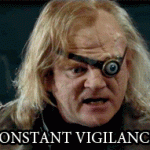
My most recent pieces for The American Conservative are about bargains that are questionably made and broken, and one of them is out of this world. First up, a kind of rigged deal that has probably affected every reader of this blog, followed by boycotts you may have participated in, and, finally, a disputed deal that justified the photo from space above.
General Mills and Consumers’ Contracting Access to Courts
In films, signing a contract is a considered, deliberate affair. Pens are inked, notaries are summoned, and stamps thud down as witness. But, in the eyes of General Mills, rights could be signed away with the beep of a supermarket scanner or the click of a “Like” button.
With a new revision to its online terms of service, General Mills has informed its customers that redeeming a cereal coupon constitutes a binding agreement to give up their rights to sue the company. Instead, if they are unsatisfied with their Wheaties, they could only settle the complaint through private arbitration. In arbitration, the customer brings suit to a private court, chosen by the company, which is not bound by the ordinary legal system.
Boycotting the Arts and Academia
The Russians are withdrawing. Not from Crimea and Eastern Ukraine, but from Washington D.C. where the Woolly Mammoth Theatre has just canceled its festival of four plays from Moscow. As the political climate chilled, the Moscow Cultural Ministry decided to pull its funds from the festival, and Woolly Mammoth was unable to make up the difference…
Conventionally, sanctions are a punitive tool of foreign policy that are intended to bring the offending country back to the bargaining table. Or, in extreme cases, to make life under the intransigent government so uncomfortable that the citizens push for regime change, whether democratically or otherwise.
An arts and academia boycott doesn’t quite fit the bill. The pain of restrictions on researchers or experimental theater companies is unlikely to trickle down to voters or up to politicians. But, even worse, when the time comes to broker some kind of détente, both sides will be worse off for losing the weak bonds of shared culture and learning. In the case of academic boycotts, the world as a whole will be worse off as researchers end up siloed and isolated from their peers, as mathematician Edward Frenkel was until he caught a lucky break.
SpaceX Sues to Shoot for the Stars
Silicon Valley CEO Elon Musk is used to red tape interfering with his transportation companies. First, his electric Tesla cars were kept out of states like New Jersey, when the state’s laws barred the company from selling cars directly to consumers, cutting out the middle man at the dealership.
While that suit is pending, Musk is opening a new case against the federal government, which he claims is unfairly excluding SpaceX from competition to launch Air Force and military satellites.
P.S. If you subscribe to the print edition of The American Conservative, an issue containing an article by me should have just landed in your mailbox. If not, be patient, and it will eventually turn up online.











